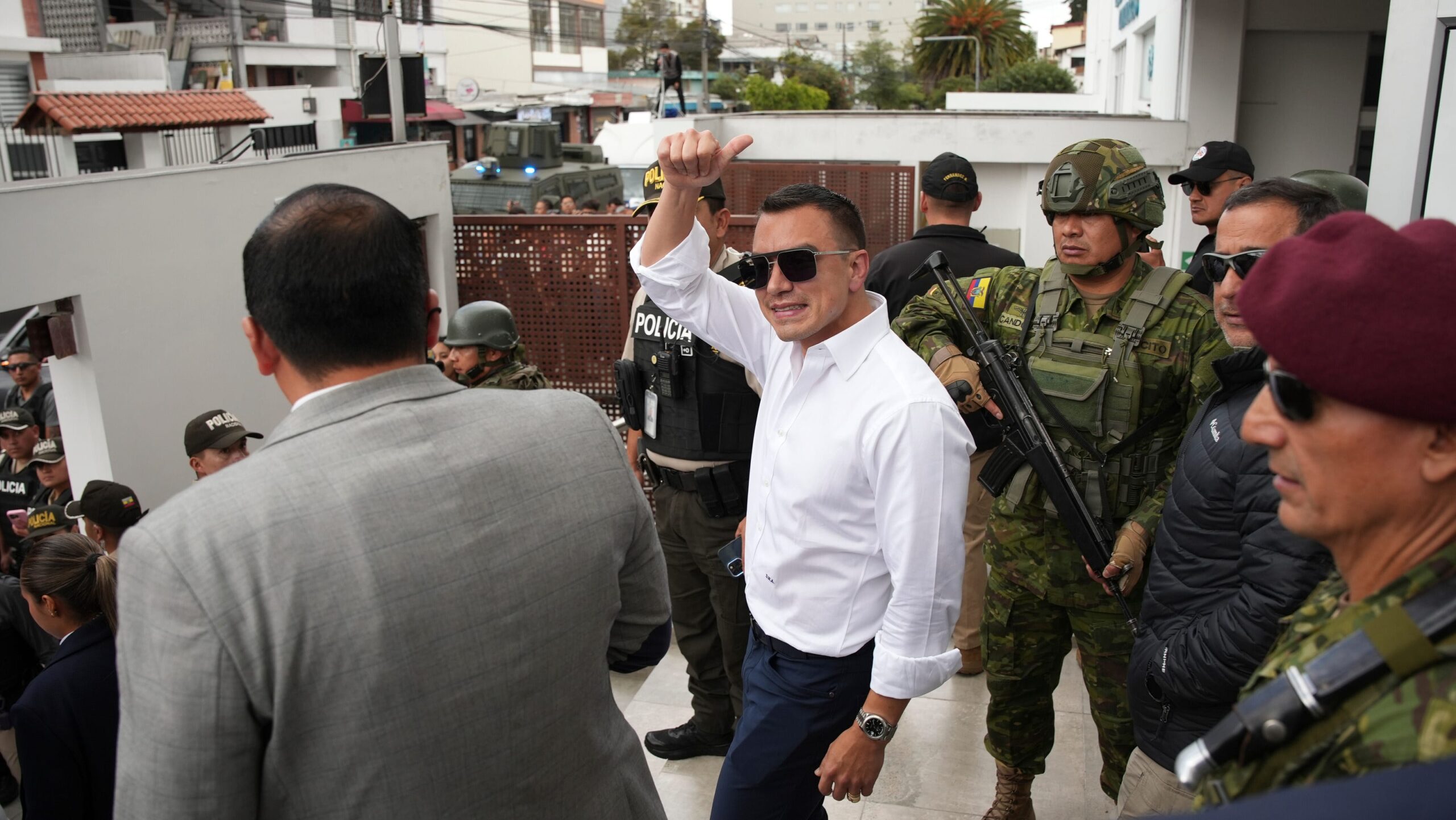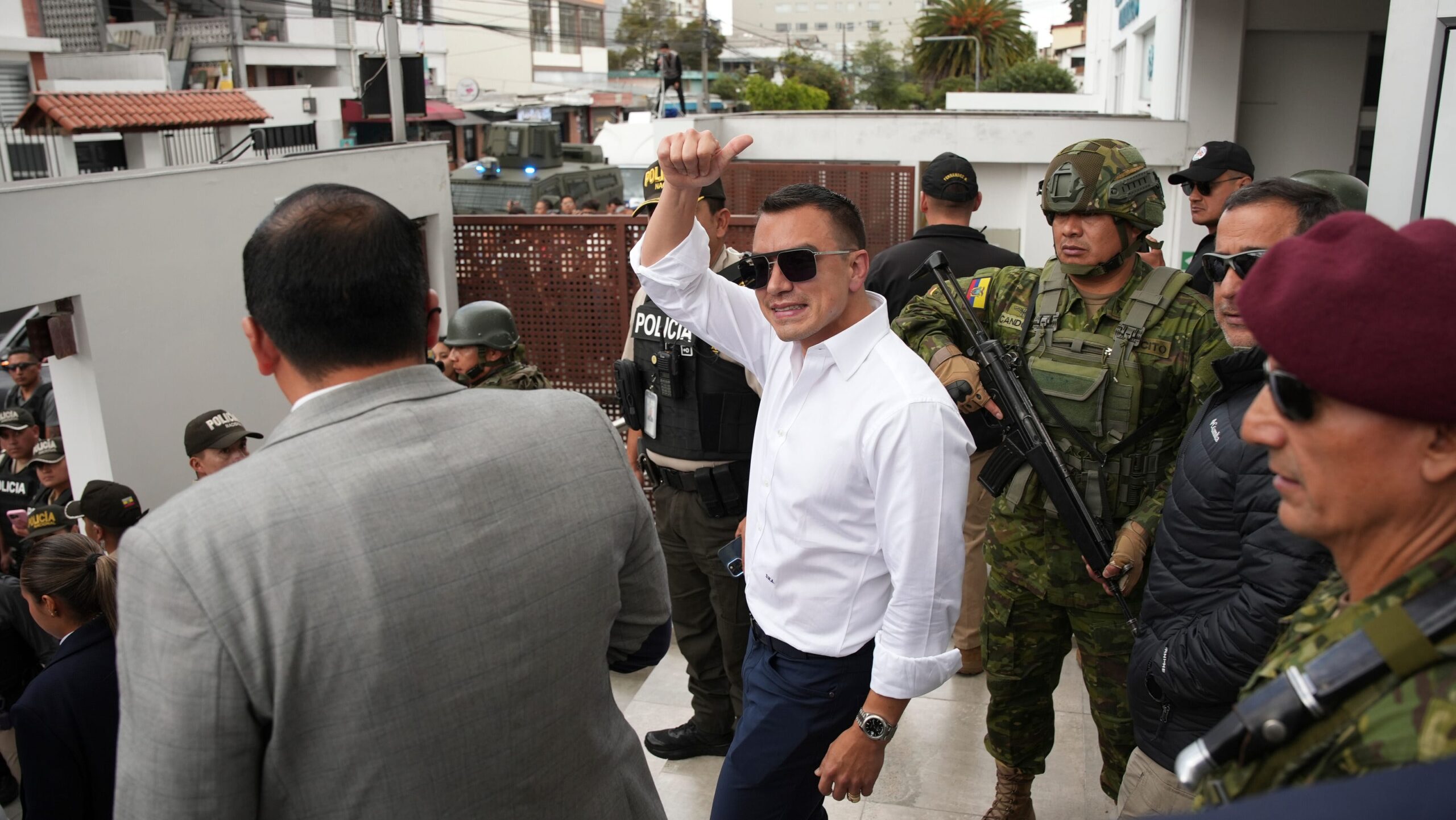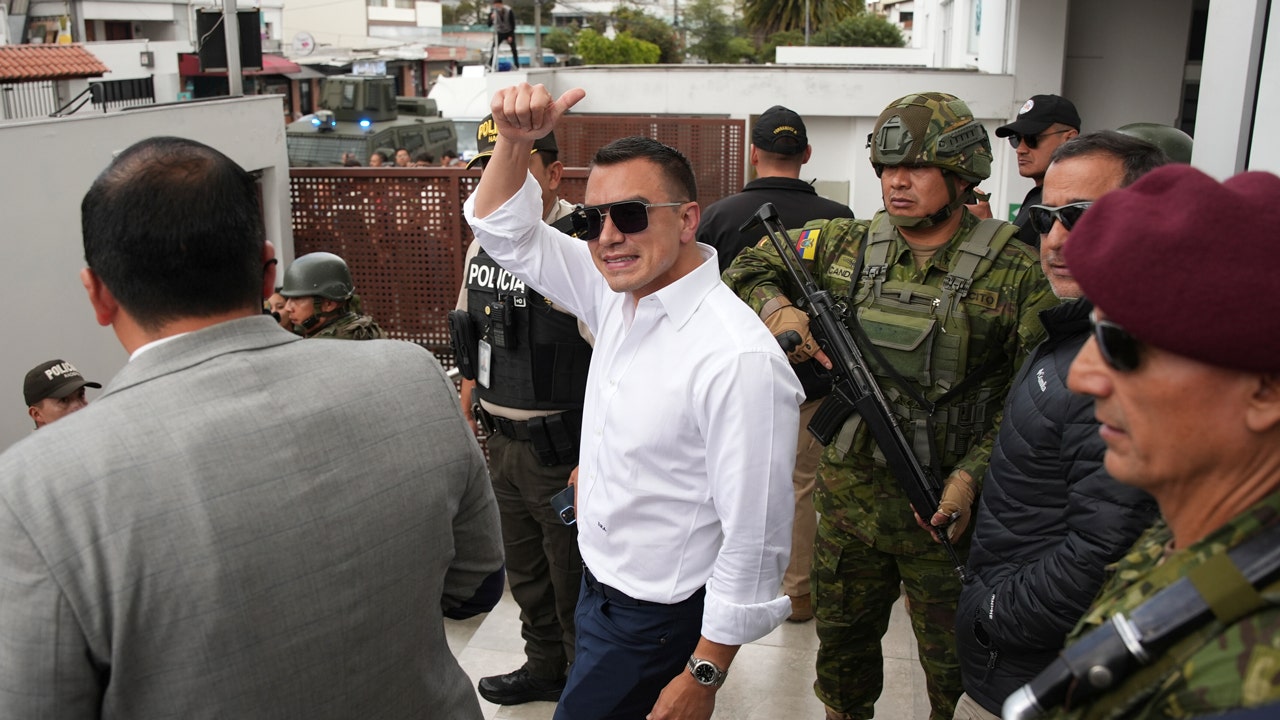Ecuador on the Brink of Change: Presidential Election Heads to Historic Runoff
In the heart of South America, a nation is at a crossroads. Ecuador, a country known for its breathtaking Amazonian rainforests, Andean highlands, and rich cultural heritage, is on the cusp of a new era. The recent presidential election has left the nation in a state of uncertainty, as the results have led to a historic runoff between the conservative incumbent and a charismatic leftist lawyer. The stakes are high, and the fate of Ecuador’s future hangs in the balance.

Ecuador’s Presidential Election Heads to Runoff: What’s at Stake?

The Ecuadorian presidential election has reached a crucial juncture with conservative incumbent Daniel Noboa and leftist lawyer Luisa González advancing to a runoff election in April. This development marks the beginning of a high-stakes competition for the country’s top office, with both candidates promising voters to reduce the widespread criminal activity that has plagued Ecuador in recent years.
With 92.1% of the ballots counted, Noboa received 44.31% of the vote, while González secured 43.83%. The two candidates are now vying for a full four-year term, a repeat of the October 2023 snap election that earned Noboa a 16-month presidency. The runoff election, scheduled for April 13, will be a decisive moment for the country, with Ecuadorians eager to choose between the two candidates’ competing visions for the nation’s future.
The stakes are high, as the winner of the runoff election will be tasked with addressing the country’s pressing issues, including the trafficking of cocaine produced in neighboring Colombia and Peru, which has contributed to skyrocketing rates of homicide, kidnapping, and extortion. As such, crime has become a deciding factor in the election, with voters weighing the candidates’ promises to reduce crime and improve the economy.
The Contenders: Noboa and González
Noboa, 37, is the heir to a fortune built on the banana trade. He opened an event organizing company at 18 and then joined his father’s Noboa Corp., where he held management positions in the shipping, logistics, and commercial areas. His political career began in 2021, when he won a seat in the National Assembly and chaired its Economic Development Commission. As president, Noboa has employed heavy-handed tactics to reduce crime, including the state of internal armed conflict he declared in January 2024.
González, on the other hand, is a leftist lawyer and protégée of Ecuador’s most influential president this century. She had only served short stints as a lawmaker before launching her presidential campaign. González has promised voters to reduce crime across the board and improve the economy. Her campaign has gained traction, particularly among those who feel that Noboa’s heavy-handed tactics have not yielded sufficient results.
Key Policies and Platforms
Both candidates have outlined their policies and platforms, with Noboa focusing on law and order, economic growth, and infrastructure development. González, meanwhile, has emphasized her commitment to social justice, human rights, and environmental protection. The candidates’ stances on key issues, such as crime, economy, and governance, will be crucial in determining the outcome of the runoff election.
- Noboa has promised to maintain a tough stance on crime, including the continued use of military personnel to support police operations.
- González has vowed to address the root causes of crime, including poverty, inequality, and lack of access to education and job opportunities.
- The homicide rate in Ecuador has dropped from 46.18 per 100,000 people in 2023 to 38.76 per 100,000 people last year, but remains far higher than the 6.85 per 100,000 people in 2019.
- Other crimes, such as kidnapping and extortion, have skyrocketed, making people fearful of leaving their homes.
Crime and Gangs: The Elephant in the Room
The trafficking of cocaine produced in neighboring Colombia and Peru has contributed to skyrocketing rates of homicide, kidnapping, and extortion in Ecuador. The impact of this illicit trade has been devastating, with citizens and the economy bearing the brunt of the violence. Voter concerns and expectations have centered on the candidates’ ability to reduce crime and improve the economy.
The candidates’ responses to these issues will be critical in determining the outcome of the runoff election. Ecuadorians are eager to choose between the two candidates’ competing visions for the nation’s future, with the winner tasked with addressing the country’s pressing issues.
Voting and Electoral Process
Voting is mandatory in Ecuador, with over 83% of the roughly 13.7 million eligible voters casting ballots in the first-round election. The high voter turnout reflects the nation’s commitment to democratic participation and its desire to shape the country’s future.
Election security is a top priority, with more than 100,000 police officers and members of the military deployed across the country to safeguard the election. At least 50 officers accompanied Noboa, his wife, and their 2-year-old son to a voting center where the president cast his ballot in the small Pacific coast community of Olón.
The path to the runoff election was marked by a competitive first-round contest, with Noboa and González emerging as the front-runners. The two candidates secured a combined total of over 88% of the vote, leaving the 14 other candidates far behind.
The runoff election will be a repeat of the October 2023 snap election that earned Noboa a 16-month presidency. The stakes are high, as the winner will be tasked with addressing the country’s pressing issues and providing a clear direction for the nation’s future.
Analysis and Implications
The runoff election will be a decisive moment for Ecuador, with the winner tasked with addressing the country’s pressing issues and providing a clear direction for the nation’s future. The candidates’ competing visions for the nation’s future will be critical in determining the outcome of the runoff election.
The implications of the runoff election will be far-reaching, with the winner tasked with addressing the country’s pressing issues and providing a clear direction for the nation’s future. The candidates’ responses to these issues will be critical in determining the outcome of the runoff election.
Noboa’s chances of winning a full four-year term will depend on his ability to maintain a strong lead in the polls and address the country’s pressing issues. González’s promise of change will be tested in the runoff election, as she seeks to reduce crime and improve the economy.
The role of the military in Ecuador’s politics will also be a critical factor in the runoff election. Noboa’s heavy-handed tactics have come under scrutiny, with some critics arguing that they have tested the limits of laws and norms of governing.
Practical Aspects and Voter Concerns
The personal cost of crime has been a major concern for Ecuadorians, with many citizens affected by extortion and harassment. The candidates’ responses to these issues will be critical in determining the outcome of the runoff election.
The economy and job security are also major concerns for Ecuadorians, with many voters weighing the candidates’ promises to reduce crime and improve the economy. The winner of the runoff election will be tasked with addressing these issues and providing a clear direction for the nation’s future.
The future of Ecuador’s democracy will also be a critical factor in the runoff election. The winner will be tasked with addressing the country’s pressing issues and providing a clear direction for the nation’s future. The candidates’ responses to these issues will be critical in determining the outcome of the runoff election.
- The runoff election will be a decisive moment for Ecuador, with the winner tasked with addressing the country’s pressing issues and providing a clear direction for the nation’s future.
- The candidates’ competing visions for the nation’s future will be critical in determining the outcome of the runoff election.
Conclusion
Ecuador’s Presidential Election: A Nation at the Crossroads
As the dust settles from Ecuador’s contentious presidential election, it’s clear that the country is bracing for a runoff that will determine its future direction. The unexpected result has pitted conservative incumbent Guillermo Lasso against leftist lawyer Daniel Noboa, leaving many wondering what this means for Ecuador’s economic, social, and environmental trajectory. Our article has examined the key factors that led to this impasse, including Lasso’s struggling economy, Noboa’s populist appeal, and the growing discontent among Ecuador’s youth and indigenous communities.
The significance of this election cannot be overstated, as it marks a turning point in Ecuador’s modern history. A Lasso victory would likely solidify the country’s neoliberal economic policies, potentially exacerbating income inequality and environmental degradation. On the other hand, a Noboa win could usher in a more progressive era, prioritizing social welfare, indigenous rights, and sustainable development. The implications of this election will resonate far beyond Ecuador’s borders, influencing regional dynamics and global energy markets. As the country hurtles towards this decisive runoff, one thing is certain: the outcome will have far-reaching consequences for Ecuador’s people, economy, and environment.
As Ecuador teeters on the brink of this pivotal moment, one question looms large: what kind of future do Ecuadorians want for their country? Will they choose a path of stability and growth, or one of social justice and environmental sustainability? The world is watching, and the answer will be written in the history books. The fate of Ecuador hangs in the balance, and the outcome of this runoff will be a defining moment in the nation’s story. The world is holding its breath, and Ecuadorians are poised to shape their own destiny. The question is: what will they choose?




Add Comment